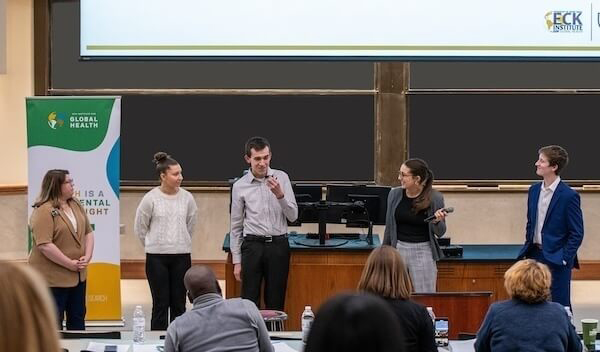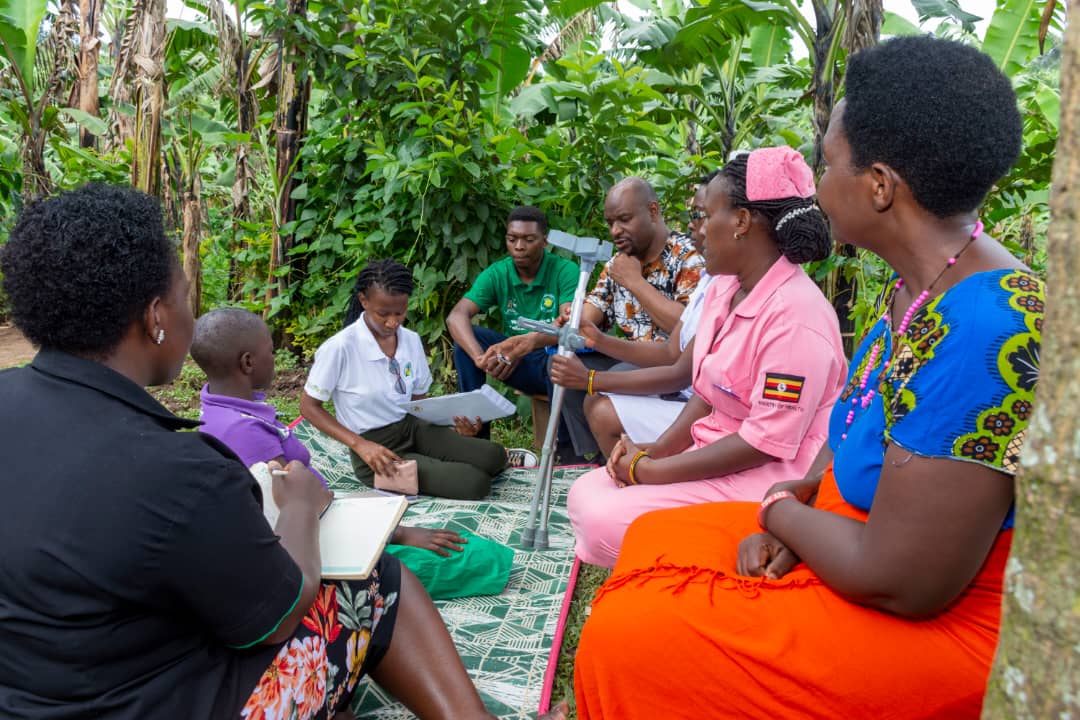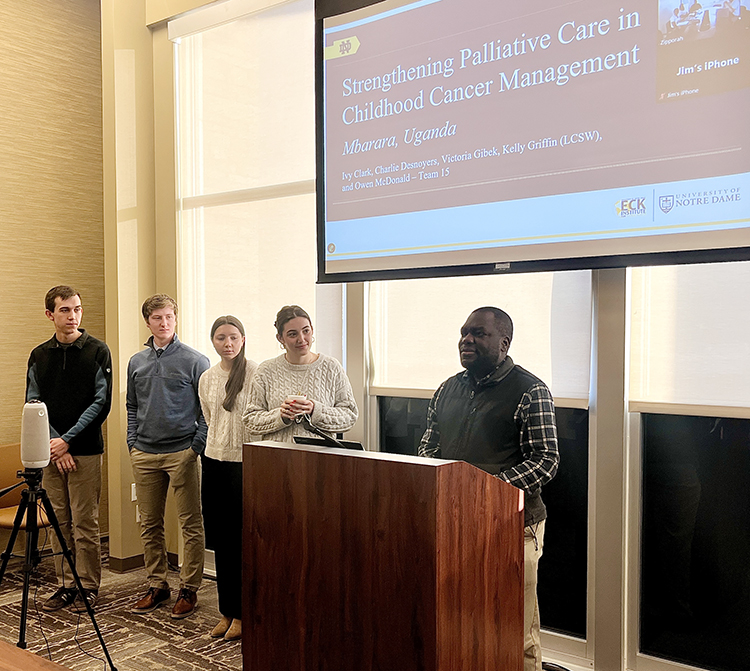Notre Dame Students Bridge Borders in Pediatric Palliative Care
In a demonstration of innovation, global collaboration and compassion, University of Notre Dame students engaged in the 10th Annual Global Health Case Competition to tackle the difficult issue of cancer care for children in Uganda. Hosted by the Eck Institute for Global Health (EIGH) at Notre Dame, this experience brought together partners from the Center for Hospice Care (CHC), the Palliative Care Association of Uganda (PCAU), Global Partners in Care (GPIC) and front-line health workers at Kitagata Hospital – home to the SHiNE (Special Hearts to Nurture Every Child) program. The event not only deepened the value and visibility of the longstanding CHC – PCAU partnership, but also illustrated the potential of student-led solutions to shape the future of global palliative care.

Each year, the Global Health Case Competition challenges multidisciplinary teams of students to design innovative, culturally informed responses to complex global health issues. This year’s case – developed through collaboration by EIGH, GPIC, CHC and PCAU – focused on improving access to palliative care and care navigation for children diagnosed with cancer in Uganda. The winning team, composed of graduate and undergraduate students in pre-med, public health, global affairs and data science, proposed a comprehensive model that emphasized continuity of care, caregiver support and system integration. Their solution included training community-based care navigators, deploying digital tracking tools and developing family-centered support systems. At the heart of their approach was a culturally grounded strategy to engage caregivers and local communities – ensuring that care remained holistic, accessible and sustainable.
Denis Kidde, Lacey Ahern, and John Mastrojohn judged the competition which took place at Notre Dame’s Jordan Hall of Science on February 8, 2025. The student’s presentation sparked dialogue around implementation, scalability, sustainability and cultural sensitivity. Discussions addressed strategies to strengthen referral systems, improve caregiver engagement, and apply mobile technology to maintain continuity of care in rural communities.

The SHiNE program – currently piloted at Kitagata Hospital under PCAU’s leadership – aims to enhance early detection, referral, and care coordination for children with cancer in under-resourced areas. This real-world context served as the grounding point for students as they developed and refined their proposal. The winning team also had the opportunity to present their solution at a forum attended by staff from CHC and GPIC in Mishawaka, Indiana, and PCAU and Kitagata Hospital staff participating virtually from Uganda. Health professionals at Kitagata Hospital offered thoughtful reflections on how such a model could complement existing efforts. “We are already seeing the value of navigation,” remarked Sr. Catherine Nakasita, Senior Nursing officer at Kitagata Hospital. “This kind of thinking helps us imagine the next phase.”
PCAU leadership echoed this sentiment, highlighting the proposal’s practical components, including community mapping and caregiver liaison training, as promising areas for potential integration into the SHiNE program. These insights are especially timely as PCAU evaluates the pilot phase and considers future adaptations.
GPIC’s role was pivotal – not only in co-developing the competition case but also in fostering connections between academic and NGO partners. Their participation reflects the unique position GPIC holds as a bridge-builder in global palliative care. This engagement underscores the value of the CHC – PCAU partnership, illustrating how real-world collaborations can drive impact across borders. By involving institutions like the University of Notre Dame, this partnership continues to inspire learning, promote innovation, and amplify community benefit – both in Uganda and in CHC’s home community of South Bend – Mishawaka.
“The students’ involvement in this case project was more than just a presentation,” said Mark Mwesiga, PCAU’s Executive Director. “It was a conversation – a mutual learning experience that enriched all sides and further reinforced the global nature of compassion and care.”

From a strategic perspective, this kind of engagement demonstrates CHC’s and GPIC’s shared commitment to cultivating global palliative care health leadership. For CHC, it offers an opportunity to show donors, partners, staff and volunteers how its partnership with PCAU translates into tangible outcomes. For academic institutions like Notre Dame, it provides a model for experiential learning rooted in solidarity, justice, and real-world application. The Notre Dame team’s experience has ripple effects: it brings visibility to global partnerships, fosters community pride, and invites others in the academic and health sectors to explore how they, too, can participate in addressing disparities in serious illness care around the world.
As PCAU continues to refine and scale the SHiNE program, the insights and recommendations from this event will help inform the path forward. CHC and GPIC remain committed to involving academic partners in global health solutions – investing in innovation, advancing health equity, and mentoring the next generation of global health advocates.
